If you’re planning on moving to South Korea, one of the most important things to know before you go are the standard monthly costs. This guide breaks down the cost of living in Korea.
I had the pleasure of living in South Korea for two years as an EPIK English teacher and really loved my time there. But before I made the big move, trying to figure out my finances was a top priority. With my hefty student loans and an itch to travel Asia, I wanted to make sure I could live a financially stable life that covered these big demands.
I was dying to know – is it expensive to live in Korea?
The cost of living in Korea is much more affordable compared to the United States. I personally found I was able to live very comfortably on the EPIK salary of 2.0 million won /month (≈ $1,840). I traveled internationally most school breaks, ventured around Korea on the weekends, and still walked away with $11,000 in savings at the end of my two years! The affordable cost of living and decent salary are why Korea is often named one of the best places to teach English abroad.
Although my experience is from the point of view of teaching with EPIK and living outside of Seoul, this insider info is still helpful for those teaching at Hagwon, working, or studying in Korea.
Here are the average prices you can expect each month and the cost of living in South Korea. These numbers are based off my personal experience and data collected from Numbeo.
This post may contain affiliate links, meaning at no additional cost to you, if you click my links and make a purchase, I may earn a small commission. Learn more on my disclosure page. Thank you for your support!
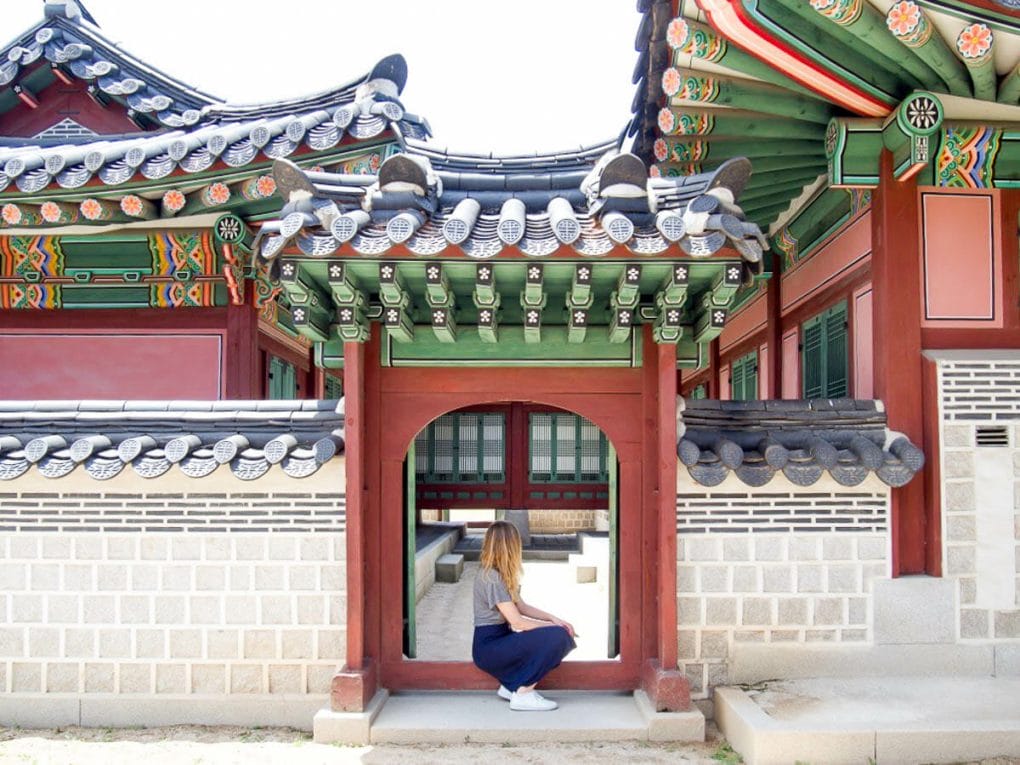
What is the Cost of Living in Korea?
The average EPIK English teacher can live in Korea for about $10,000 a year with free rent or about $15,000 for expats who pay rent. How do I know? Because I’ve done it! And I’m here to share you a break down of the standard monthly expenses to help you find your cost of living in Korea.
This figure is a generous coverage of the basics. Your personal expenses will ultimately depend on where in Korea you’re living, your school/work situation, and your personal spending habits. But no matter where you live in Korea, as an expat you’ll face very similar expenses.
1. The Cost of Rent in Korea
Free | ₩300,000 – ₩800,000+/month | $290 – $720+/month
EPIK teachers enjoy the super fantastic perk of free accommodation, which means zero rent costs for the month! That’ll save you some serious coin over the year! The apartments EPIK provides are also fully furnished which means you don’t have to worry about paying for furniture either.
The EPIK program is just one way to teach English in Korea/move abroad. If you’re moving to Korea without having your accommodation sponsored, rent is affordable in Korea. Outside of the big city centers, rent can average from as low as $300 – $600/month usually for a studio or one bedroom apartment. In the heart of Seoul, you’ll probably see rent costs of $800-$1,000+. And of course, the bigger the place and the better the location, the more expensive.
No matter if your housing is provided or not, you’ll probably be required to pay “key money”. Key money in Korea is the security deposit, and you usually need to pay 3 months rent up front as the deposit. If you get housing from your school, they will tell you what that amount is (mine was about ₩600,000, split with my school) and it’ll most likely be taken from your first paycheck, and returned to you when you move out.
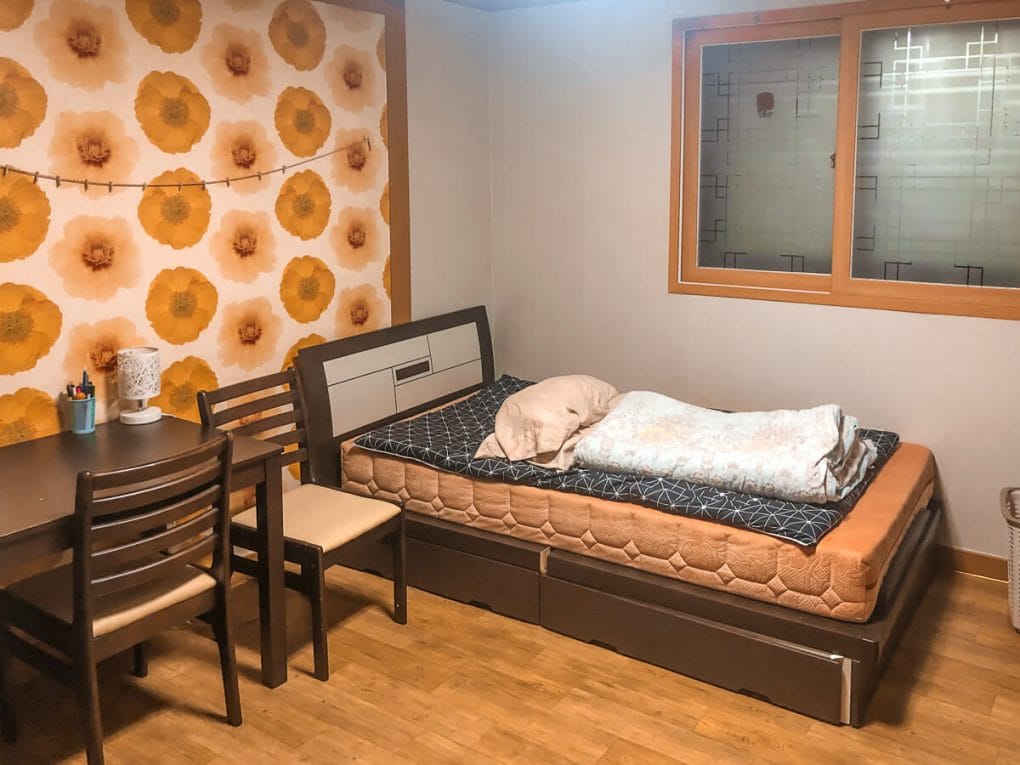
2. Average Monthly Utility Costs in Korea
₩75,000 – ₩175,000+/month | $70 – $150/month
Your utilities each month will depend on where you live, your agreement with your landlord, as well as your resource usage. Some apartments have these costs built into the base rent price, while others require separate payments.
Electricity
Winter months: ₩5,000 – ₩8,000 | $5 – $7/month
Summer months: ₩10,000 – ₩20,000 | $9 – $18/month
Korea has four distinct seasons, so the electricity and gas bill vary quite a bit throughout the year. In the summers, it can become quite hot and humid. You’ll probably need the air conditioner in the summer whereas in the winter you’ll rely more on the gas-powered heat. Otherwise, electricity is quite cheap here!
Gas/Heat
Winter months: ₩45,000 – ₩60,000 | $40 – $55/month
Summer months: ₩5,000 – ₩10,000 | $5 – $10/month
Your hot water and heating system in Korea are typically gas-powered. So when you need to turn on the ondol (the underfloor heating system), you’ll see quite a spike in your gas bill. Otherwise in the summer, it’s hardly anything at all!
Water
“Free” | ₩15,000 – ₩30,000 | $13 – $25/month
It’s pretty common for rent prices to include the cost of water, and that’s what I personally experienced. Of course the cost of water isn’t technically free, but I didn’t have to budget for that cost as it was already built into the cost to rent out the place, which my school covered.
If you happen to live in an apartment that doesn’t cover the cost of water, you’ll probably pay an average of about $20 per month.
Internet
“Free” | ₩20,000 – ₩30,000 | $18 – $25/month
Internet is another utility that’s sometimes included in the rent, and for my apartment that was the case. I was also fortunate that I didn’t need to call the service provider to get internet set up, it was already hooked up and ready for me at my apartment.
Not everyone has this luxury and some apartment complexes may require you to set up your own internet service. I knew many teachers who would opt for a portable WiFI “egg” as their main source of WiFi for at home. The plus of a WiFi egg is that it can also double as your data service for your cell phone if you don’t want to bother with two separate bills.
Garbage
₩5,000 – ₩10,000 | $5 – $10/month
In Korea, there are very strict rules for garbage disposal. You don’t actually pay monthly costs for garbage pick up or disposal in Korea, but rather you must buy special bags for your food waste and your recycling. These bags aren’t that expensive, and as a single person you’ll probably find yourself spending not more than $10/month on these bags every month – and that’s super high!
You can purchase these special garbage bags at most grocery stores, and they can cost anywhere from ₩80 for a 2 liter bag, ₩200 for a 50 liter bag, and ₩4,880 for a 120 liter bag. That’s $0.07, $0.18, $4 / bag respectively. Super cheap.
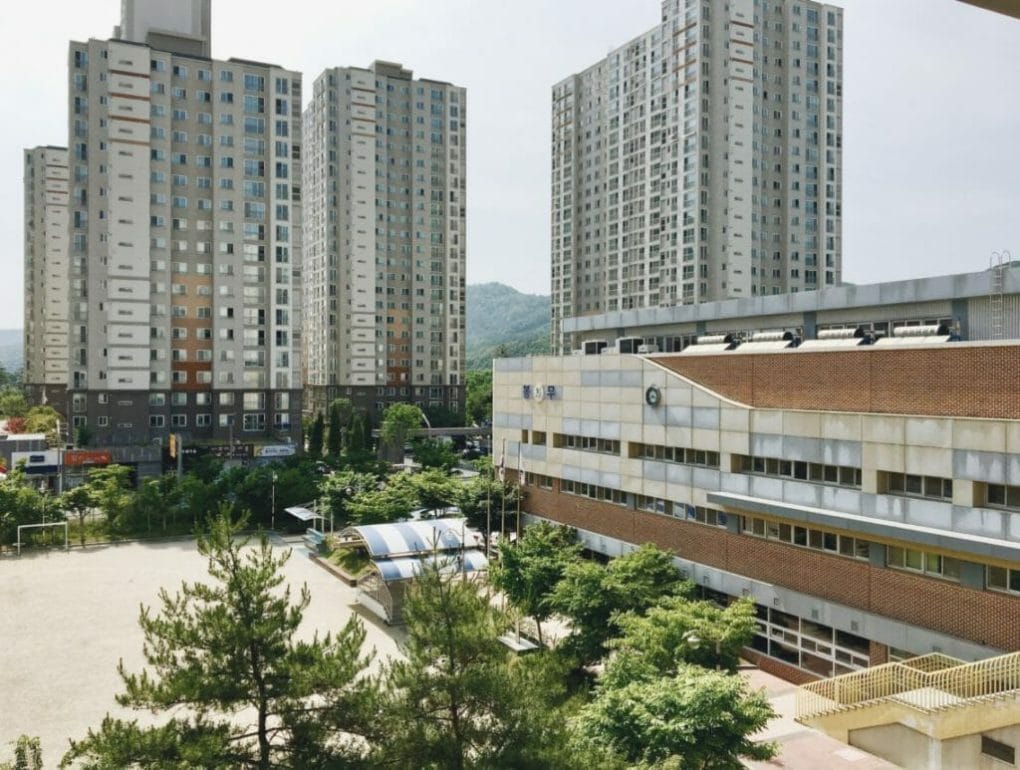
3. Monthly Phone Bill Costs in South Korea
₩30,000 – ₩70,000 | $25 – $60/month
When choosing a phone plan in Korea, there are countless options. There are prepaid SIM cards, WiFI eggs or portable pocket data devices, and yearly contracts. I opted to get a year contract that included 10GB of data and unlimited text and domestic calls because I knew I was going to be spending at least a year in Korea. This plan cost me ₩52,000 per month, or about $45.
There are a lot of cheaper plans out there, and my friend paid about ₩30,000 for her plan which included 2GB of data. As mentioned above, the WiFI egg is a good option for those who also need internet for at home because it can double as both. Just know that the egg can be inconvenient at times as it needs to be recharged, need to be turned on to work, and doesn’t included talk or text.

4. Public Transportation Costs in South Korea
₩50,000 – ₩80,000 | $45 – $70/month | ~₩1,200/ride
Your public transportation costs will vary a lot based on where you live, if you have to commute to work, or if you travel around the city often, etc. I lived about 45 minutes outside of downtown Daegu, and was pretty social. My costs were usually about $50+ a month. I would take the bus and subway a lot on the weekends back and forth between home and various attractions. But I didn’t need to take the bus to work everyday because I lived within walking distance from my school.
You can save on public transportation costs by getting a bike or choosing to walk. You also save a small percentage on fare when you use a T-Money or Cashbee transportation card, which I highly recommend using. You can get bus cards at any convenience store for a few dollars, and you must top them up with money to pay for rides. Simply tap your card when you get on the bus/subway, and tap when you get off (for most cities). These cards work for public transportation in most major cities, but not everywhere in Korea.
The public transportation fares in Korea aren’t the same everywhere. In Daegu for example, you’ll find it’s usually a flat rate of ₩1,200 one-way. In Seoul, the fare is based on how far you travel and can be more expensive if you for example ride the bus from one end of the city to other (thus why tapping on AND off).
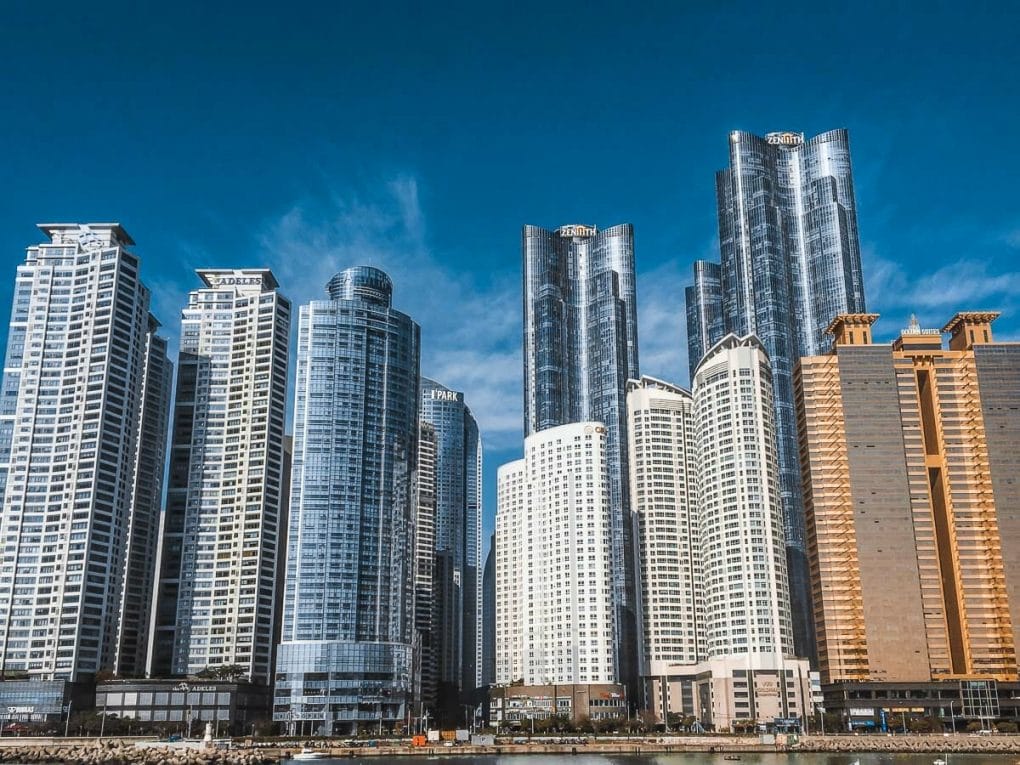
5. Average Cost of Groceries in Korea
₩100,000 – ₩150,000 | $35 – $90/month
Groceries are pretty reasonably priced in Korea, if you buy local items. Western grocery stores and products are available in Korea at larger grocery stores, but are more expensive. I typically spent about $25/week on my groceries for a single person living in Korea, who opted to eat school lunch five days out of the week.
I’m not the biggest meat eater, often bought seasonal fruit, and skipped the Western items unless for special occasions so my costs were pretty low. Here are some rounded average grocery store prices from Numbeo to give you a clearer idea:
- 1 liter Milk: ₩2,500 | $2.25
- 1 Loaf White Bread: ₩3,000 | $2.70
- Dozen Eggs: ₩3,000 | $2.70
- 1kg Chicken Fillets: ₩10,600 | $9.50
- 1kg Beef Round: ₩33,000 | $30.00
- 1kg Apples: ₩8,100 | $7.25
- 1kg Bananas: ₩4,000 | $3.60
- 1kg Tomatoes: ₩6,500 | $5.80
- 1kg Potatoes: ₩4,000 | $3.60

6. Korean National Health Insurance
₩58,000 – ₩65,000 | $51 – $60/month
Having health insurance through Korea’s National Health Insurance Service (NHIS) is mandatory for all foreigners living in Korea. Your employer is responsible for getting you set up in the system and contributes 50% of your monthly insurance fees. That means the other half should come directly out of your paycheck every month.
Health insurance in Korea costs about 5.89% of your monthly salary. This rate can change year to year so it may vary. For EPIK teachers who make about ₩2.0 mil a month, your health insurance will cost about ₩117,800/month. Split in two with your employer means you’re on the hook to pay ₩58,900/month for insurance.
The national insurance plan in Korea and actual care is beyond affordable. I had a double eye and sinus infection that required a visit to the doctor and antibiotics. The entire trip cost me less than $30. I was stunned. I also had a mole removed for about $20 (sorry for TMI but so cheap!!)
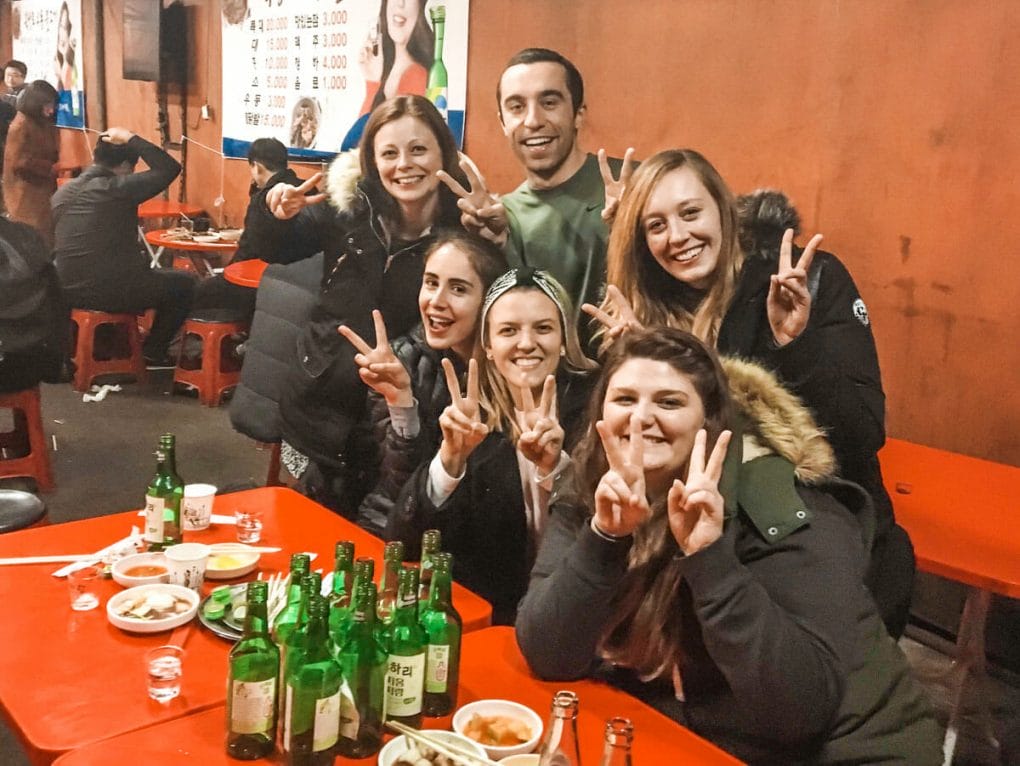
7. Korean National Pension
₩90,000 – ₩100,000 | $80 – $90/month
All native English teachers must also pay into the Korea’s National Pension Service (NPS), and your school is required by law to match your contribution. Your exact monthly contribution is actually a percentage of your salary (4.5% by you, 4.5% by your school), so your exact amount will vary. EPIK teachers that make ₩2.0 mil a month, will need to contribute ₩90,000/month, and your school will also contribute ₩90,000/month to your pension.
Only Australians, Americans, and Canadians are entitled to a full refund of their pension contributions after leaving Korea. (sorry to everyone who isn’t from one of the above countries!) The pension refund is a very nice lump sum, and I believe I left Korea with about $4,000 from my pension.

8. Cost of Bars + Eating Out in Korea
₩100,000 – ₩250,000+ | $90 – $225+/month
Again, this can either cost you a ton or a little depending on who you are. In some circumstances, it can actually be cheaper to eat out than prepare your own meal. If you’re really on a budget, you can order some kimbap (Korean ‘sushi’) for about ₩2,000/$1.75 or bibimbap (mixed rice with veggies) for about ₩5,000/$4.40. An average Korean meal I’d say is less than ₩10,000/$9 won while going western can be ₩15,000 – ₩20,000 or more. A fancy meal for two can easily get up to ₩50,000/$45.
If you’re into the bar and party scene, an average beer may cost you ₩5,000 – ₩8,000 whereas a cocktail can be ₩8,000 – ₩12,000. A bear at the convenience store is usually only about ₩1,500 – ₩3,000 and a cheap bottle of soju is usually ₩1,000 or less.
Cafes are also a huge part of Korean culture, and there’s no doubt you’ll probably find yourself indulging in a Korean coffee speciality from time to time. A standard latte at a Korean cafe can run about ₩5,000 – ₩8,000. Coffee can be expensive in Korea, especially when it’s an Instagrammable work of art, which is often the case in Korean cafes!
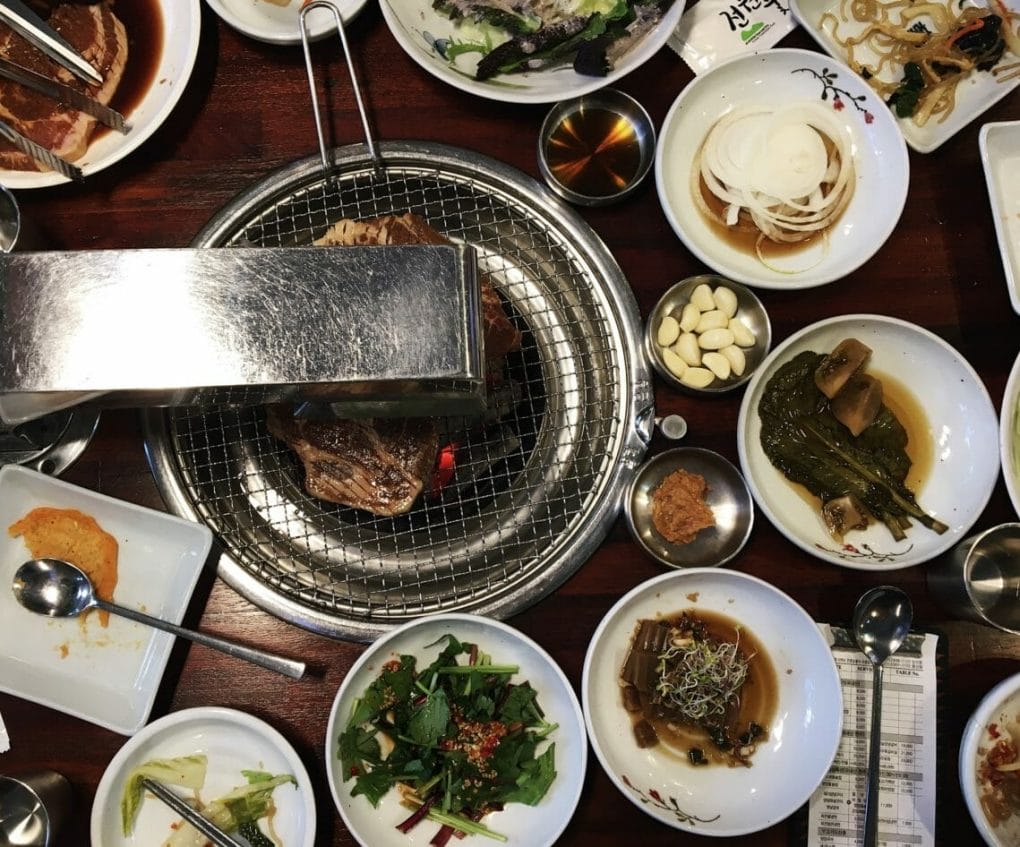
9. The Cost of Travel in Korea
If you’re anything like me, you’ll be planning numerous trips to travel around and see the rest of the country. South Korea has a fantastic network of national trains and buses that make it easy and relatively affordable to get around. Even local taxi fare tends to be pretty cheap by American standards. Here’s a quick list of some standard travel expenses you can expect.
- Taxi Ride: ₩12,000 – ₩20,000 | $10-$18
- National Bus One-Way Ticket: ₩10,000 – ₩50,000 | $9-$45 | Daegu to Seoul econ. ticket ₩19,000
- Fast Train One-Way Ticket: ₩30,000 – ₩85,000 | $26-$75 | Daegu to Seoul econ. ticket ₩35,000
- Slow Train One-Way Ticket: ₩20,000 – ₩50,000 | $18-$45 | Daegu to Seoul econ. ticket ₩30,000
- Night in a Hostel: ₩25,000 – ₩35,000 | $22-$31
- Night in a Hotel: ₩100,000 – ₩200,000+ | $90-$180
Taking a national bus in Korea is often one of the most affordable ways to travel, then the slow train, and then the fast train or KTX. The fare is best checked online as it can change depending on demand and where exactly you’re traveling to and from. Most tickets can be booked in advance online, on an app, or at the train station.

10. EPIK Teacher Monthly Expenses
₩80,000 – ₩140,000 | $71 – $125/month
If you’re an EPIK teacher, you may face some of these miscellaneous monthly costs.
School dinners and events
₩20,000 | $18/month
Some schools ask teachers to contribute a small amount every month to put towards teacher events, dinners, and gifts. This isn’t always the case, but my school asked to take out ₩20,000 out of each paycheck. If we didn’t have a get-together, they would actually give me ₩5,000 per week back in cash.
My school also asked me if I wanted to participate in these events, which I agreed because I didn’t want to miss out on the cultural fun of teacher outings. If you don’t want to pay this fee, you may be able to opt out.
School Lunches
₩40,000 – ₩45,000 | $36-$42/month
As a teacher, you’ll probably have the option to eat the school lunch every day. My school had a specific rate for each lunch, and would take out my lunch money for the previous month out of each paycheck which was often about ₩40,000. I’m a lazy queen and not a picky eater so I was all for the convenience of eating lunch at school. Plus it is super cheap for what you get.
But if you’re a picky eater, a vegetarian, or don’t actually enjoy traditional Korean food, then you probably don’t want to eat your school lunch every day. You can just tell your school no and they won’t charge you.
Korean Income Tax
₩60,000 – ₩110,000 | $36-$42/month
Korea’s income tax rates depend on a few factors, but most English teachers will probably find themselves paying between 3%-5% per month. Based on the standard EPIK pay rate of about ₩2.0 mil, at 4% is roughly ₩80,000/month.
As an American, I filed for the U.S. resident tax exemption granted to U.S. citizens in South Korea. This tax exemption is good for up to two years and means I do not pay Korean income tax from my paycheck! To learn how to become eligible, check out this article!
If you’re not an American, you should look into the possibility of a tax treaty between your home country and South Korea. This isn’t an option for everyone, but sometimes there are agreements in place that can affect your tax responsibility.
*I’m not a tax expert, so always be sure to do your due diligence and check out your local laws, current Korean laws, and consult an actual tax professional to ensure you’re following the laws 😉

11. Miscellaneous Costs in Korea
₩500,000+/month
Obviously there’s much more to life than the costs I’ve listed above! During my time in Korea, I often spent about ₩500,000 or so each month on miscellaneous things like clothing, entertainment, social times with friends, and eating and going out. I’m not a huge shopper (although shopping in Korea is pretty reasonable) or a crazy partier, so you may need to budget more if that description fits you! 🙂
Months that I took a weekend trip or two, usually added about ₩200,000 – ₩300,000 extra in sending per trip.
Here are some more averages for the cost of living in Korea.
- Hair Cut: ₩10,000 men | ₩40,000+ women
- T-Shirt: ₩15,000
- Jeans: ₩69,500
- Manicure: ₩45,000
- Meal at McDonald’s: ₩6,500
- Gym Membership: ₩65,000
- Pair of Running Shoes: ₩95,000
- Movie Theater Ticket: ₩12,000
- Weekend Trip: ₩250,000+ (2 nights accommodation, 3x meals for 2 days, transportation, misc)
There you have it folks! You can enjoy a pretty reasonable cost of living South Korea. There are some things like groceries and alcohol that are more expensive, but ultimately your salary will go much farther here than at home. That means more travel and fun experiences for you and me!
If you’re planning to apply to the EPIK program, check out my EPIK packing list for Korea to help you plan what to bring!
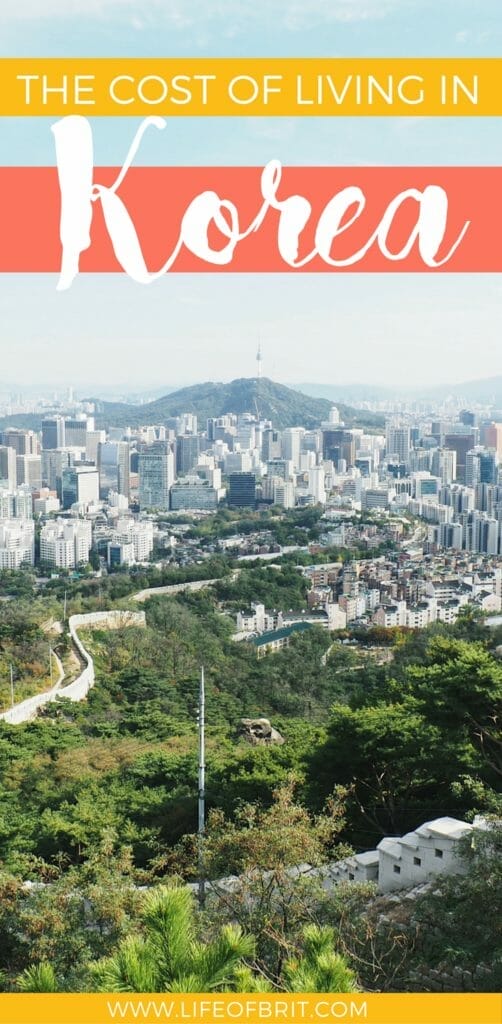
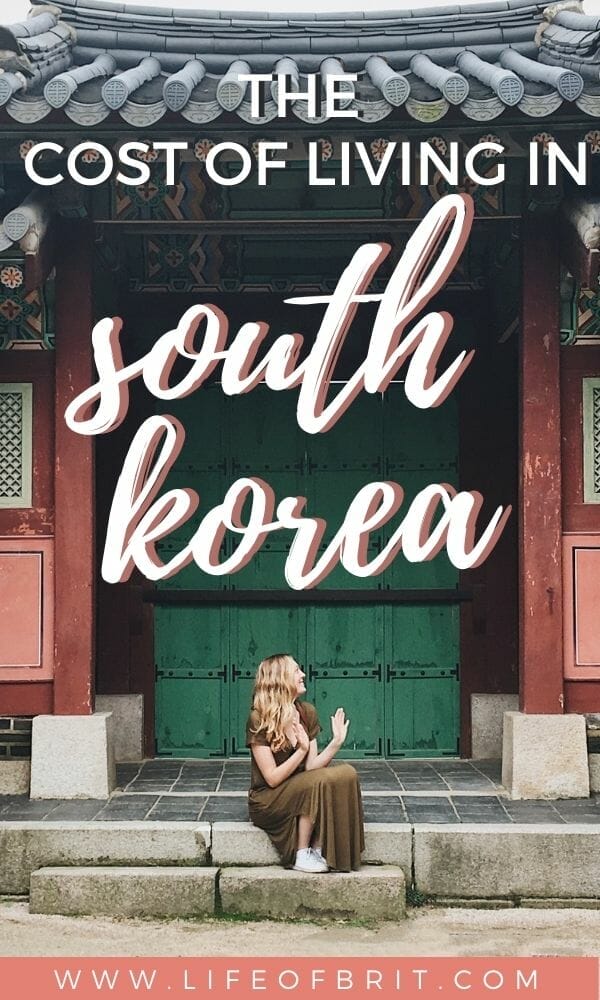


Hi! Just wondering how you got $86/94,000 won for healthcare? I’m moving soon and trying to plan a monthly budget and EPIK says health care is a tax of 2.95%, so if my salary is 2.2 million won it would only come out to around 65K won. Has it changed or are there extra costs that aren’t explained in the benefits.
Hello!! I’m unsure about the 2.95% figure (I’ve never heard that before), but when I was teaching with EPIK, that is the amount that was taken out of my paycheck each month! I confirmed with my friends still living in Korea and they are paying about 90k per month with an expected increase for the upcoming year. The EPIK website doesn’t list every single fee or tax and it may not be current. These little deductions can also vary by your city / region and even school. There are often other small and local community fees or taxes that may be taken out so when planning, factor in a bit of room for the unexpected!! For example, my school took out a 20k per month fee to go towards school bonding activities. I didn’t have a choice! I hope this helps 🙂